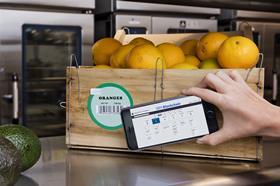
Two of the world’s leading fresh produce companies are working with IBM, retailers and other major food companies to explore how blockchain – a new, more secure record-keeping technology – can be used to make the supply chains safer and more traceable for fruit and vegetables.
The collaboration, which IBM said was intended to further strengthen consumer confidence in the global food system, includes US multinational Dole Food and leading berry marketer Driscoll’s, as well as major North American retailers Walmart and Kroger.
“Unlike any technology before it, blockchain is transforming the way like-minded organizations come together and enabling a new level of trust based on a single view of the truth,” said Marie Wieck, general manager, IBM Blockchain. “Our work with organizations across the food ecosystem, as well as IBM’s new platform, will further unleash the vast potential of this exciting technology, making it faster for organizations of all sizes and in all industries to move from concept to production to improve the way business gets done.”
IBM has identified the international fresh produce supply chain as ripe for improvement when it comes to keeping track of its various constituent links.
Every year, it points out, 400,000 people die as a result of contaminated food, but delays in tracing the source of an outbreak mean that many of those deaths might conceivably be avoided.
“It can take weeks to identify the precise point of contamination, causing further illness, lost revenue and wasted product,” the group said in a statement. “For example, it took more than two months to identify the farm source of contamination in a recent incidence of salmonella in papayas.”
Blockchain, it said, was “ideally suited” to help address these challenges because it establishes a trusted environment for all transactions.
“In the case of the global food supply chain, all participants - growers, suppliers, processors, distributors, retailers, regulators and consumers - can gain permissioned access to known and trusted information regarding the origin and state of food for their transactions,” it continued.
“This can enable food providers and other members of the ecosystem to use a blockchain network to trace contaminated product to its source in a short amount of time to ensure safe removal from store shelves and stem the spread of illnesses.”
Dole, Driscoll’s, Golden State Foods, Kroger, McCormick and Company, McLane Company, Nestlé, Tyson Foods, Unilever, Walmart and others have signed up to work with IBM on developing blockchain as an enabling technology for the food sector.
“Together,” it said, “they will help identify and prioritise new areas where blockchain can benefit food ecosystems.”
Collaborative issue
According to those involved, Dole, Driscoll’s and the other companies working with IBM are keen to collaborate rather than compete when it comes to improving supply chain traceability.
“As an advocate for greater transparency in the food system to benefit customers, Walmart looks forward to expanding on our initial work by collaborating with others to accelerate exploration on how this technology can be used as a more effective food traceability and food safety tool,” commented Frank Yiannas, vice-president of food safety at Walmart.
“Blockchain technology enables a new era of end-to-end transparency in the global food system – equivalent to shining a light on food ecosystem participants that will further promote responsible actions and behaviours.”
He added: “It also allows all participants to share information rapidly and with confidence across a strong trusted network. This is critical to ensuring that the global food system remains safe for all.”
Howard Popoola, Kroger's vice-president of corporate food technology and regulatory compliance, commented: “Safety is a key value for Kroger, and our partnership with IBM positions us to explore and test blockchain technology as a solution for enhanced food safety across our business.”
'Food safety is a universal priority for food retailers and companies. It's not a competitive advantage; it benefits our customers to have greater transparency and traceability in the supply chain.'



